- News
- Reviews
- Bikes
- Components
- Bar tape & grips
- Bottom brackets
- Brake & gear cables
- Brake & STI levers
- Brake pads & spares
- Brakes
- Cassettes & freewheels
- Chains
- Chainsets & chainrings
- Derailleurs - front
- Derailleurs - rear
- Forks
- Gear levers & shifters
- Groupsets
- Handlebars & extensions
- Headsets
- Hubs
- Inner tubes
- Pedals
- Quick releases & skewers
- Saddles
- Seatposts
- Stems
- Wheels
- Tyres
- Tubeless valves
- Accessories
- Accessories - misc
- Computer mounts
- Bags
- Bar ends
- Bike bags & cases
- Bottle cages
- Bottles
- Cameras
- Car racks
- Child seats
- Computers
- Glasses
- GPS units
- Helmets
- Lights - front
- Lights - rear
- Lights - sets
- Locks
- Mirrors
- Mudguards
- Racks
- Pumps & CO2 inflators
- Puncture kits
- Reflectives
- Smart watches
- Stands and racks
- Trailers
- Clothing
- Health, fitness and nutrition
- Tools and workshop
- Miscellaneous
- Buyers Guides
- Features
- Forum
- Recommends
- Podcast
feature
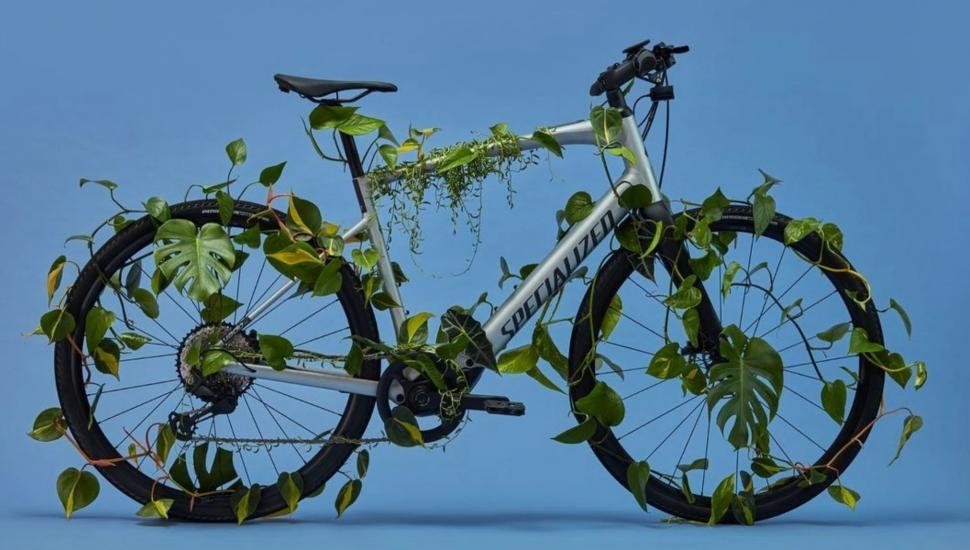 2022 Specialized hybrid bike green leaves eco
2022 Specialized hybrid bike green leaves ecoWhat is the carbon footprint of your bike?
As the world becomes more environmentally conscious, it's clear that bikes can play a large part in reducing our emissions; but just because they're part of the solution, it doesn't mean they don't have any carbon footprint at all. We talked to some industry experts in an attempt to find out how just large that footprint is, and whether the bike industry may be getting something of an environmental pass.
Before diving into what brands are (and aren't) doing, it's useful to know just where these emissions are coming from. Luckily for us, Trek, the largest manufacturer of bikes in the US, released its independent sustainability and corporate commitment report in 2021. In this, the company highlighted areas of highest impact and the emissions produced to manufacture different bikes in its range.
Trek's sustainability report
The report shows that while there are significant emissions due to transport, distribution, events and employee commutes, these are dwarfed in comparison to the scale of emissions related to the production of bikes.
Another takeaway is the difference in emissions needed to produce bikes of different materials.
The chart above shows emissions for the Fuel mountain bike. The first four models are built around an aluminium alloy frame and the rest are carbon, the latter of which has a drastic impact on the carbon dioxide equivalent (CO2e) figure.
The carbon frames require almost double the CO2e to produce. Steel frames are better still, producing two-thirds fewer CO2 emissions than aluminium, and it's also fully recyclable.
> The UK 'Great reset agenda' - "cars should not be used for journeys of less than a mile"
Of course, another way to reduce emissions from bike production is to source parts and materials locally, as this greatly reduces the environmental impact of transportation.
Here is the breakdown of the most CO2e-intensive components. It's worth noting that this Madone not only has a carbon frame but also carbon fibre wheel rims, handlebars and seat post. It's once again clear that carbon fibre has a negative impact on the footprint of a bike, and the 197kg CO2e figure makes this well over Trek's average 174kg CO2e figure, which also includes e-bikes.
> E-bikes can do wonders for the environment
Trek does point out that the footprint of its bikes (on average) is offset if it replaces a car for just 430 miles.
We've redone the calculation for the Madone (197kg CO2e) and the 'Rail' e-bike (229kg CO2e) as they are higher footprint bikes. They would need to replace a car for 488 and 567 miles respectively, so still well within what can be reasonably expected during a bike's lifetime if you do indeed use it for transport rather than just leisure.
How about bamboo?
There are plenty of people out there who think that the big brands need to do more. We had a chat with Netham Bamboo Bikes, a small company from Bristol that is pioneering greater sustainability in bike production. As the picture below shows, Netham's bikes are made of bamboo bound with hemp, and the lugs are recyclable aluminium.
We asked Netham where it thinks the biggest environmental gains can be made when producing bikes. Director Laura Niblett described transportation as a necessary evil, saying: "We live in a global world and whilst we should try to minimise our shipping we feel that it's unrealistic to expect everything to be manufactured next to its end location."
Niblett added that she thinks the transportation of bikes should happen by sea or land rather than air wherever possible, as although much faster it produces considerably more emissions to fly; and this is where, in her opinion, some bike manufacturers aren't doing so well.
> The most environmentally friendly bike ever made? New igus:bike is made from 100% recycled plastic
Then there are the materials used. Netham chose bamboo because the grass (bamboo is not trees, just to clarify!) is already carbon negative.
Bamboo soaks up a huge amount of CO2 and only takes five years to grow. Netham realises that although the material is "perfect for the vast majority", there is still a place for bikes made of other materials.
For example, the advantages of carbon fibre for keen racers are undeniable. It would appear, then, that as always materials should be used in moderation. The sustainability and ethics of their source need to be carefully considered, and consumers should think twice when considering what they 'need' their bike to be made of.
Niblett also brought up a point about the lifespan of bikes. Carbon bikes often get scrapped much sooner than bikes made of other materials due to their impact resistance and the expense of repairs. I have personally scrapped my fair share of carbon bikes following crashes, and also successful self-repairs followed by more crashing that eventually rendered the bike unusable.
We're assured that the bamboo bike, in the very rare case that you do manage to break one, will come back stronger after a simple repair process using epoxy resin.
Netham urges consumers to carefully consider the material of the bike before purchasing, saying that buying once and trying to reduce our throw-away culture is the most sustainable choice.
> How safe is your carbon frame?
And that brings us to epoxy, a name synonymous with being harmful to the environment. Niblett explained that not all resins are created equal, and that Netham has teamed up with Entropy Resins, which is bio-based instead of oil.
If a small company like Netham can find solutions, then why aren't brands with huge R&D budgets able to find solutions as well?
The major drawback of using bamboo as a bike material is how labour-intensive the bikes are to make. Each frame takes 40 hours to make as the bamboo needs to be dried and handcrafted.
When asked if the big bike brands are doing enough, the simple answer was no. Niblett is of the opinion that it's small start-ups that seem to be finding the solutions and not the bigger brands.
Realistically the only way that this is going to change is if brands are held accountable by their customers and the media.
Specialized
With this in mind, we had a chat with Will Chan, Engineering Manager at Specialized, to get a better idea of the company's views on sustainability.
> Cycling is better than walking (or car sharing) when it comes to saving the planet finds a study
First, we asked which areas Specialized thought had the largest impact on the carbon footprint of a bike.
Specialized echoed the points from the Trek Sustainability Report, informing us that it is currently conducting an environmental report of its own using external consultancy firm Anthesis. The results of this study will be published in about a month from now, and aims to go one step further than Trek's by including a full product lifecycle analysis including end-of-life.
Despite the 'Social and Environmental Responsibility Team' at Specialized being created just two years ago, it does seem that progress is being made; for example, Specialized has reduced packaging and now only uses the two most widely recycled plastics where they're still necessary. Their 'Zero Waste Bike Packaging' initiative means that all aspects of their packaging can avoid landfill.
It has also partnered with Redwood Materials to provide a battery recycling scheme that's not exclusive to just Specialized bikes. This scheme has successfully recycled 10,000 lbs of lithium-ion batteries in the first six months of operation. While there is still some way to go, it is positive that we are beginning to see such initiatives come to fruition.
Specialized is also in the process of installing solar panels in its California HQ and is investing in green energy credits, which essentially means purchasing energy off the national grid with money that is then invested in renewable sources.
Earlier, we mentioned that carbon fibre bikes appear to have a higher footprint than aluminium or other materials. We asked Specialized for its view on this:
Chan explained that these numbers can be very misleading, as the scales of production are completely different.
"Alloy bikes have the overall greater impact simply because there are so many more of them," he said.
> How environmentally sustainable is your cycle clothing?
Chan went on to explain that alloy bikes benefit from being part of a more mature manufacturing process, and that when items are made in larger quantities the footprint of each product can be smaller.
Specialized said that it has already made good progress in reducing the impact of carbon fibre; for example, its Power Pro saddle uses a carbon base made from reclaimed carbon fibre from 'offcuts' and waste material that the company produces.
> Review: Specialized Power Pro with Mirror Saddle
Chan explained that it's far easier to recycle unprocessed carbon fibre when there's only one grade, rather than when there's a mix of grades as is the case on most bikes.
He did also point out that this is a process that's likely to mature, and as this happens there will be more uses for reclaimed carbon fibre. It's realistic that in a few years, Specialized will manage to reuse all of its waste carbon fibre; but it's unlikely that this will be used on bike frames, as the recycling process reduces the mechanical properties to a point where it's best used for injection-moulded applications.
> Reynolds finds steel is 'greener' than titanium in study
When asked about how he thought the footprint of carbon fibre bikes could be reduced, Chan was honest about the fact the material requires a lot of energy to process, and that the majority Specialized uses comes from Japan, a country that still uses 87% fossil fuels (including natural gas).
Specialized says that while it will be looking for any possible way to reduce its environmental footprint, it will be channelling its efforts into where the biggest impact can be made. This will be influenced by the results of its white paper, but there will likely be a bigger focus on alloy bikes as these are produced on a much larger scale.
Chan added that "everything was on the table".
In many cases, we kept coming back to the old saying of "Reduce - Reuse - Recycle". This is something that many of us will have had hammered into us at school, but Chan explained that the order that they're in is of utmost importance.
He also claimed that Specialized aims to reduce waste and keep building the best bikes it possibly can, as that will mean those bikes stay relevant for longer, adding that recycling isn't an indefinite solution as there's very often a limit to how many times even "recyclable" materials can go through the recycling process.
Finally, I asked Chan if he felt that the bike industry had a 'free pass' when it came to its footprint, and whether he felt bike manufacturers were doing enough:
"We never feel like we can do what we want on the pretences of the product being "good", but it's everyone's [Specialized included] responsibility to do more."
Chan added that Specialized is proud of the environmental progress it has made, and that staff are passionate about making changes for the better. He claims that there is "little" opposition to plans put forwards by the Specialized Social and Environmental Responsibility Team which allows them to introduce new ideas quickly.
Conclusion
A point that everyone seems to agree on is that bikes ARE part of the solution to reducing our transport emissions. To achieve this there needs to be a cultural change that will only come from an increase in bike-friendly public transport and cycling infrastructure. Currently (using 2020 data) the cycling modal share in the UK is just 2%. We've got a long way to go before we reach the Netherlands' 26%.
It appears that large bike brands feel the largest impact that they can have in reducing global emissions is to get more people on bikes. While this is true, it is positive to see that brands are beginning to make changes for the better and reduce the footprint of their bikes at the producton and distribution phase.
For many years the environmental impact of bike companies was largely overlooked; not, as we've come to realise, because they thought that as makers of zero-emission vehicles they had a free pass, but because like many industries, change was slow. It also wasn't a priority for customers who were buying the bikes. While writing this article I've spoken to many passionate employees that are pushing forwards change, and this along with a shift in consumer values is changing the bike industry for the better.
> Should you choose a steel, aluminium, titanium or carbon road bike?
From a consumer point of view: do think about what your bike is made from, and do ask where it came from. Think about how long it's going to last... and most importantly, fly the flag to encourage more people onto bikes.
Do you think the bike industry could/should be doing more to reduce its carbon footprint? Let us know in the comments section below...
Jamie has been riding bikes since a tender age but really caught the bug for racing and reviewing whilst studying towards a master's in Mechanical engineering at Swansea University. Having graduated, he decided he really quite liked working with bikes and is now a full-time addition to the road.cc team. When not writing about tech news or working on the Youtube channel, you can still find him racing local crits trying to cling on to his cat 2 licence...and missing every break going...
Latest Comments
- Mr Blackbird 1 hour 59 min ago
A lot of large SUV drivers seem to be fat. Maybe owning a large, wide car makes them feel slimmer. A bit like buying their clothes from Jackamo (...
- Dnnnnnn 1 hour 28 min ago
It is sad for the individuals concerned but (and this is a general point, rather than specific to this story), we're much better off overall for...
- No Reply 2 hours 18 min ago
I agree with Pogacar regarding social media. The likes of Facebook, Instagram have done untold damage, especially to the minds of young people....
- David9694 2 hours 23 min ago
Lorry carrying 25 tonnes of beer catches fire on the M11...
- No Reply 2 hours 27 min ago
If you're a cyclist on a road you are public enemy number 1.
- Rendel Harris 2 hours 57 min ago
He advocates only riding mountainbikes solely offroad for ultimate safety, which is great if you're a millionaire of leisure living in Colorado...
- ktache 3 hours 28 min ago
That looks like a fun bike. Frame only, 2 and an 1/2 grand.
- wtjs 4 hours 24 min ago
Fair enough, personal experience may trump (not that one) theory. However, the bonking I have experienced has been due to lack of carbs. Your point...
- Rendel Harris 5 hours 52 min ago
mdavidfrodo?
- wtjs 9 hours 31 min ago
in the UK we have policing which to a greater or lesser extent relies on assistance from members of the public......
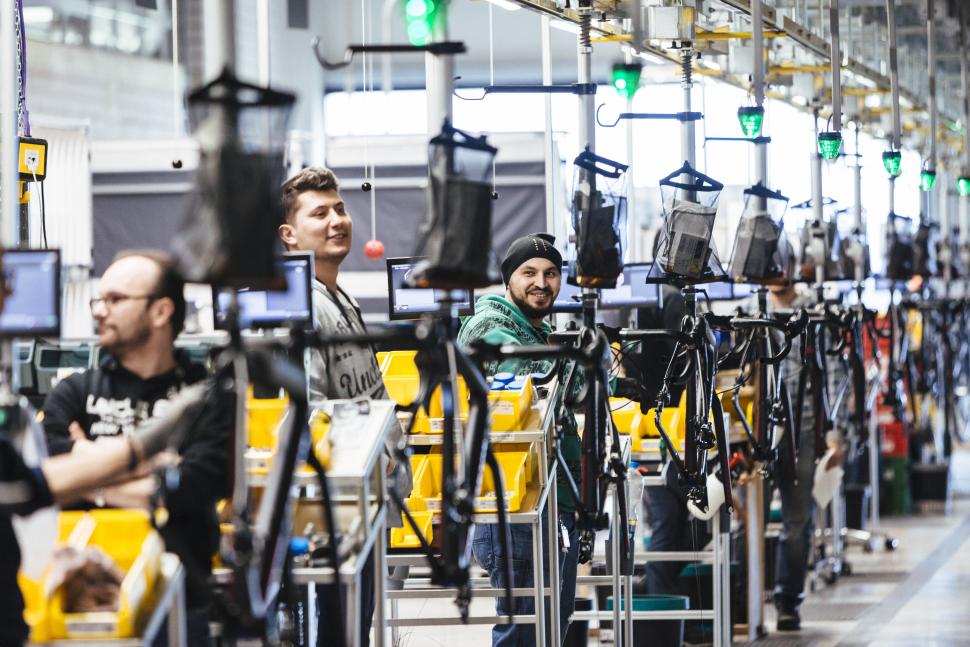
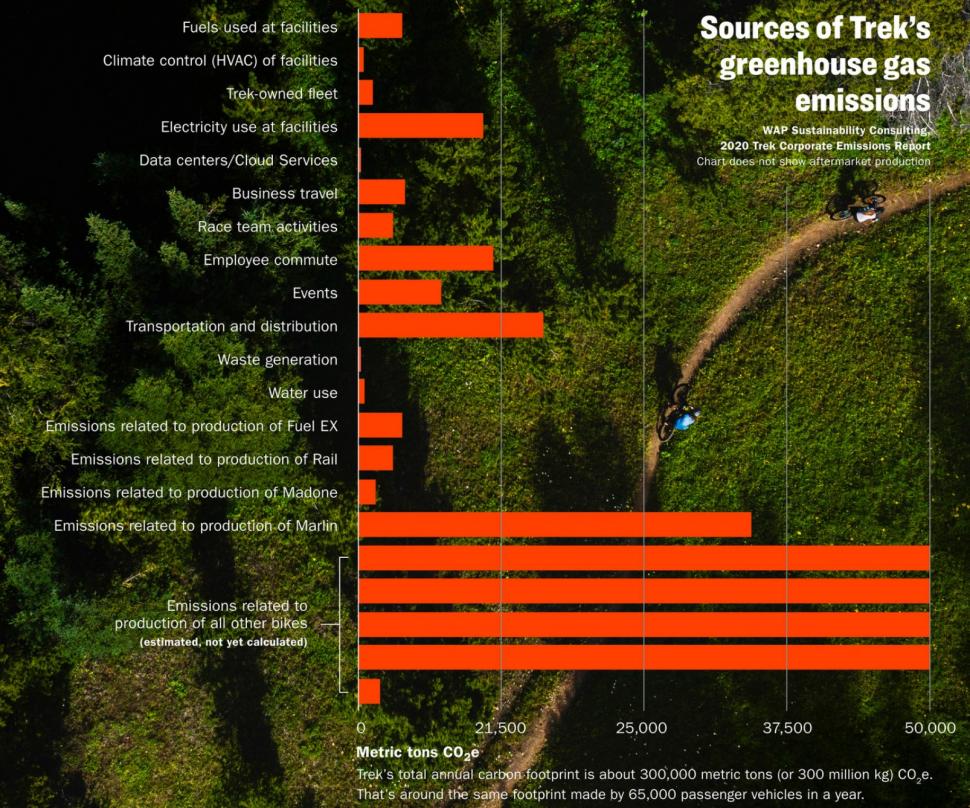

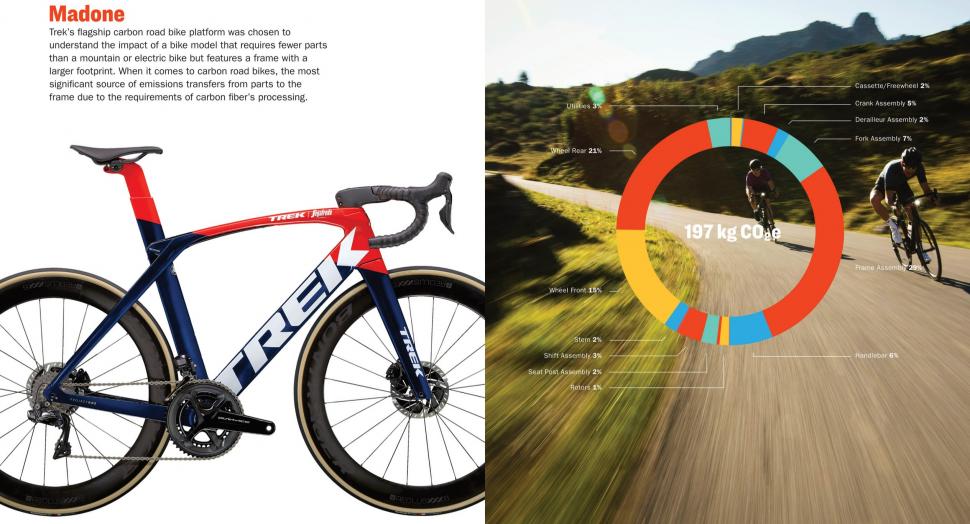
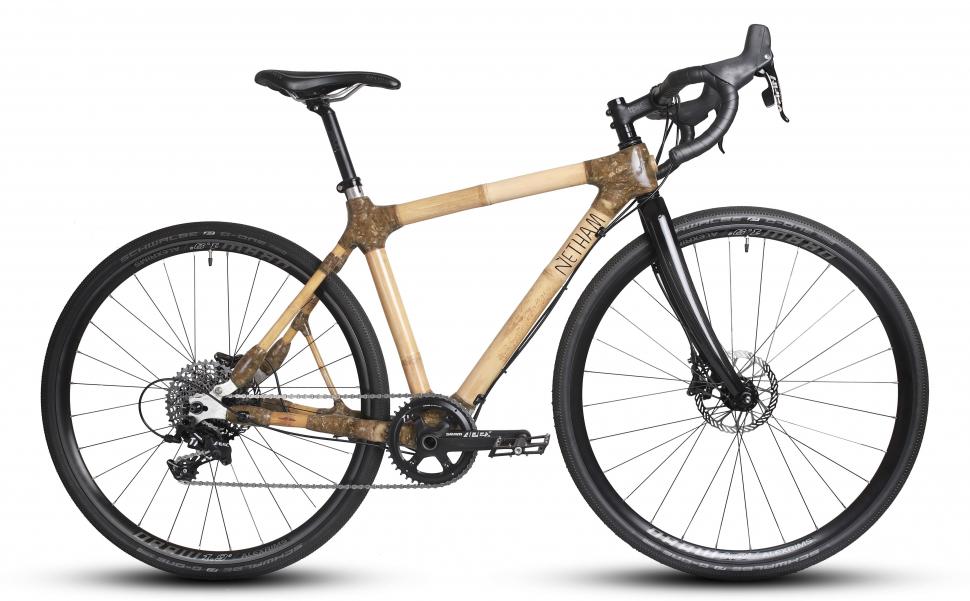
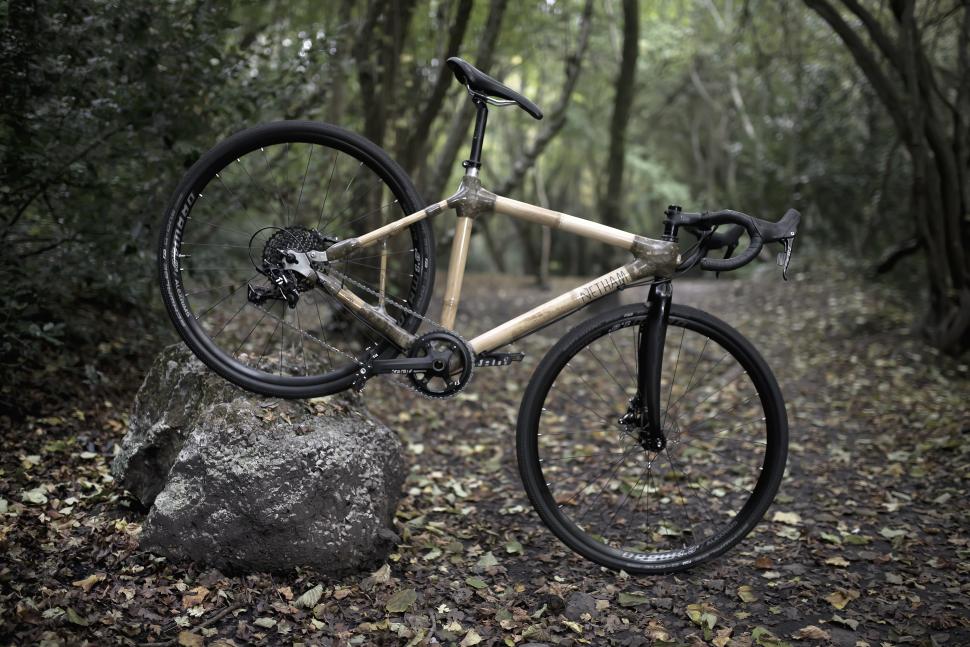


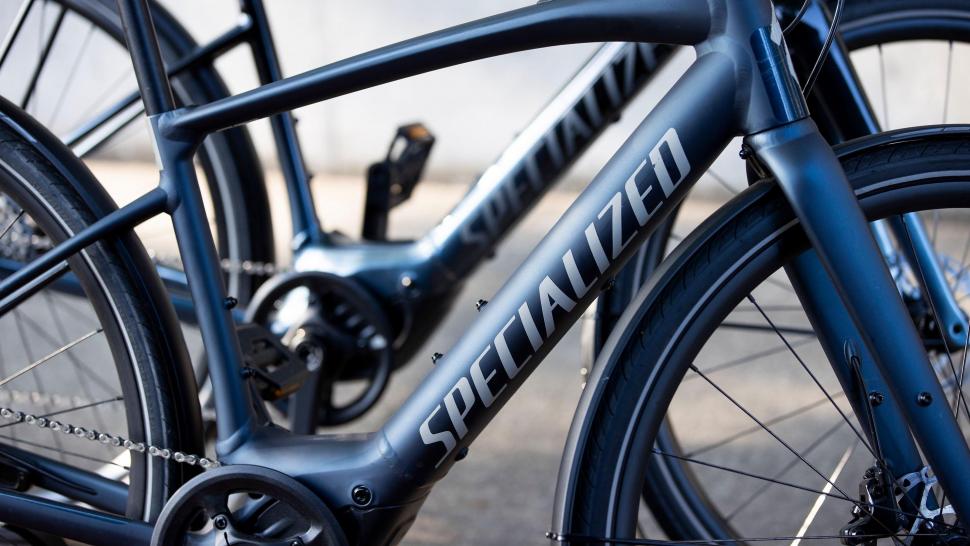
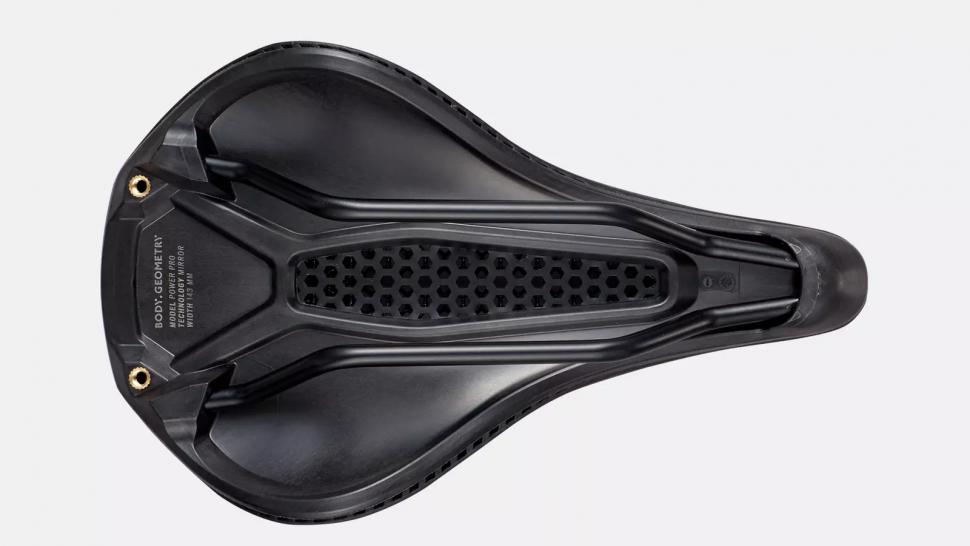
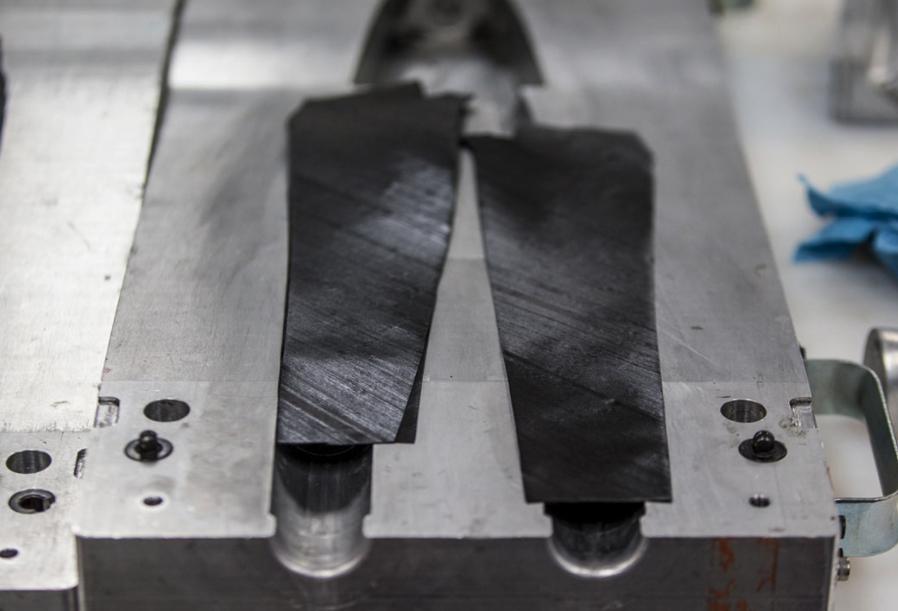

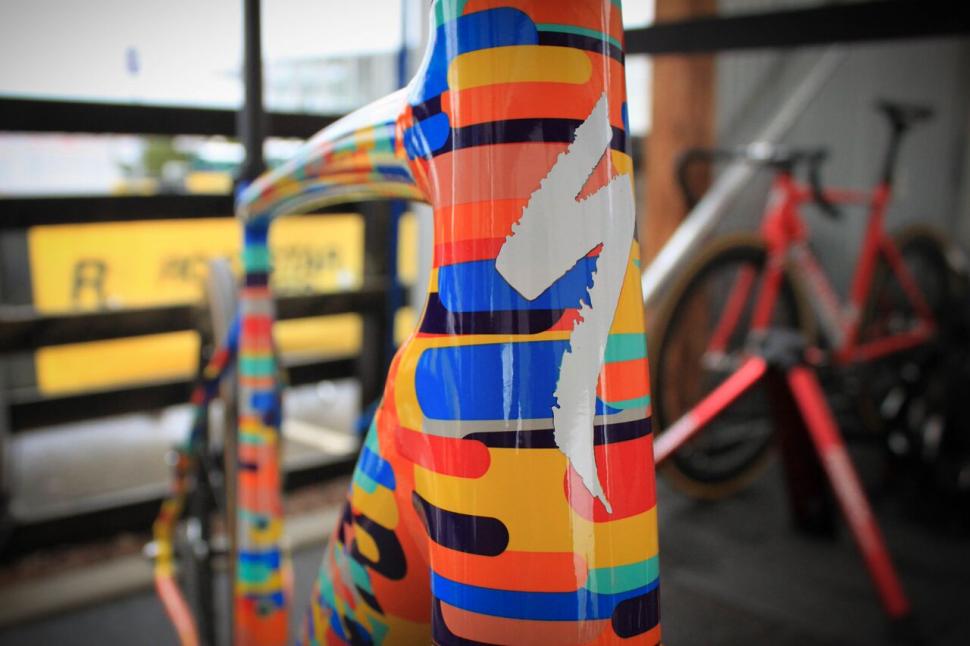
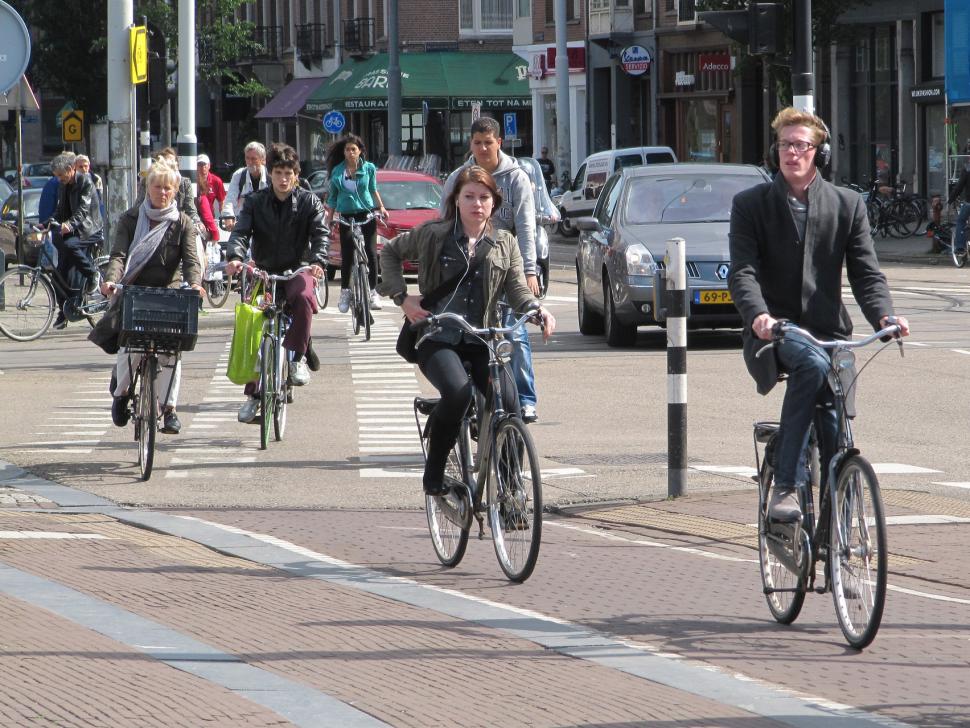
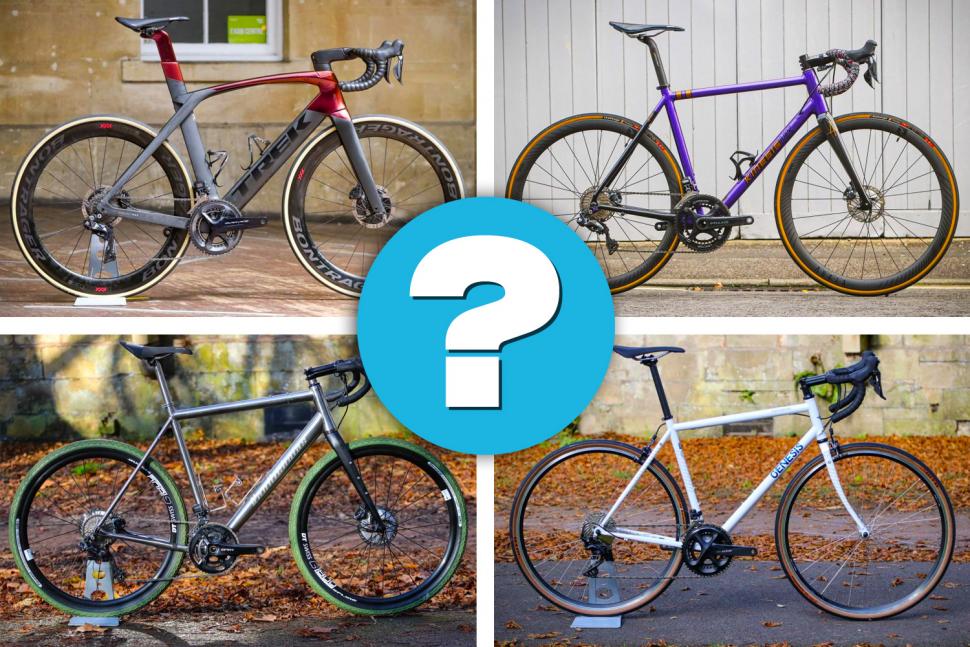
Add new comment
23 comments
The bike's carbon footprint is offset in just a few hundred miles of non-car journeys by removing the fossil fuels burned but that doesn't take into account the wear and tear on the car and therefore not needing to replace it with a new one as soon. A new car produces like 50-100 times the CO2 that a new bike does. If buying brand new bikes as often as you want for your whole life means you buy one less car over your lifetime it is likely a net positive, even if you don't ride them.
I was with you until the last six words. If you don't ride the bikes, how do you improve the longevity of your car?
Maybe you spent so much money on bikes you can't afford to buy a car? Maybe your capitalist desire for meaningless consumerism that would otherwise drive you into the dealership is sated by the act of the bike purchase?
O...k... I took the premise of your post to be that replacing a car journey with a bike journey reduces wear and tear on the car, improves its longevity and therefore potentially means you save the production CO2 of one car in a lifetime. Hence confusion about how not riding them helps.
I love this, the Woke Olympics. Please let us know how we can virtue signal more, and add a hashtag #Istandwith...(insert latest hip cause here). Always amuses me how Carbon Footprint is used too, considering it was coined as a cynical means of shifting blame onto others from a massive polluter who discovered how to virtue signal and let the Woke muppets cheer them on. We need more of little aspergeric Greta scolding us...
Oh - is this a new discipline or did I have the wrong Woke Olympics? I thought that was only for those who hadn't actually chosen to compete? So BAME / BIPOC people (or choose your favourite grouping term), anyone outside standard male / female boxes (a "lifestyle choice" would you say?) and their friends?
Although maybe you'd rule "a bunch of shouty types on the internet" eligable too?
The Woke Olympics you're describing sounds like it's for a wider set of folks, only excluding major fossil fuel companies and their users. Plus a subset of US Republican supporters?
I await further information on this interesting new contest!
I can understand someone making a rambling, incoherent post late at night, but to do so at 9am... for your own health I think you need to cut down on the drinking.
Late night (early morning) in e.g. LA though...
Definitely better to be Woke than Asleep (or just drunk).
Do you ever post anything on cycling ?
Do you even ride a bike ?
That's nice. If the best you can come up with is making fun of the mental health conditions of those with whom you don't agree, that says rather a lot for the strength of your case.
Seems like they don't care about the message, but just the person saying it - kinda backwards if you ask me.
How dare you..!! (grit your teeth while you say it in your shrieking Greta tone).
At least Road.cc could tell us which frame will best withstand the heat as we hurtle to climate destruction. Will my carbon forks delaminate, should I avoid rim brakes because the rubber pads will simply melt...? How can I buy into this alarmism while continuing to push the onus onto the poor to deliver these Woke dreams of the rich.
Self-flaggelating climate alarmists queue on the left please. Meanwhile please keep buying all our cycling gear from China (just make sure you keep ignoring the fact China pumps out >30% of CO2 emissions this year with 11,535 MGt, while the UK generates 364).
No. Avoid all you like but rubber burns before it melts. Perhaps your experience of rubber and friction is limited.
Well which are you? Alarmist or bothered about China's emissions? Are you unconvinced about the UK carbon accounting as so much manufacturing emission is effectively off-shored to China? If so, you're in good company, as Ms G Thunberg blew the whistle on this very eloquently.
Perhaps you think there's no point doing your bit and hence you get confused by the fallacy of the heap. Or perhaps you just get a kick out of being unfocusedly anti-woke, which after all puts you in such grand company.
A pedantic, but important point - aspergers syndrome is not a mental health condition.
Apologies if that's wrong, always keen to learn - how is it defined?
A developmental disability.
Pinning your odious colours to your mast there. At least we know where you're coming from (not a place I'd like to visit).
What is it about road.cc articles and comments that draws such an influx of hate-spewing, fulminating anti-cycling idiots? You and your anti-cycling mates must have sorry lives if you keep coming back here just to hurl insults.
Truly pathetic.
If you have something constructive to say, whether about the concept of carbon footprinting, corporate vs individual responsibility or even climate change then I'm ready to listen. Otherwise you're just wasting your time.
Very interesting article.
Pink bike did something similar based on an in house report from Starling bikes.
Air-freighting was their biggest single impact. Sea freighting was surprisingly low impact.
https://m.pinkbike.com/news/starling-environmental-impact-report-finds-c...
I don't buy new bikes. I couldn't possibly afford it. What I do do is build my own out of scapped or donor machines. Not only is this recycling, it means I can customise the machine in any way I want without regard to any original price paid. Plainly, there are still consumables, and these I do tend to buy from reputable sources and brands.
In my opinion, the worst polluters in bicycle manufacturing are the factories churning out millions of cheap and nasty BSOs that end up at the tip after a year, because they cannot be easily kept in a serviceable condition.
I would have thought the bikes use would also have some bearing, for example I use my carbon road bike for pleasure rides and not many replace the car rides so it's impact is higher, where as my commuter bike replaces in the region of 2000 miles a year in a car so has a much lesser impact or even going into a net negative impact though not having a car and not burning fossil fuels.
Your leisure activity may not be so bad either. That might contribute positively to your health. Although some people are involved in bike crashes and may be more so while riding more recreationally it could be that summed over everyone doing so this is a net health benefit (I don't have figures). Healthcare is a massive user of resources.
If your play is riding that could be a positive in that you're doing something with relatively low-emissions / low resource use. As long as you're "riding to the ride" that is. So your choice has less impact than something else you could have chosen e.g. building rockets, making plastic or rallying.
We have to accept that people are allowed to have a life and what they chose to do in their spare time will have an associated carbon footprint. Cycling for pleasure, starting from and finishing at your home is obviously one of the greenest pastimess you can have but like anything there's plenty of opportunity to up your carbon footprint. Cycling holidays for example.
I can't think of any hobbies where that would not be the case even if the activity itself would be considered low carbon. In fact keen golfers or ramblers will nearly always start their day in the car.